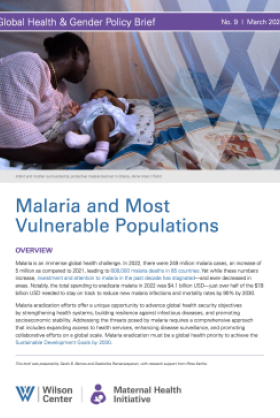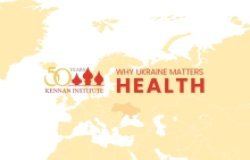Strengthening Relationships To Defeat Hidden Hunger: The Importance of Government and Private Sector Cooperation
Tamara Bekefi, Independent Consultant, and Michael D. Jarvis, Private Sector Development Specialist, World Bank Institute
Overview
Tamara Bekefi, Independent Consultant
Michael D. Jarvis, Private Sector Development Specialist, World Bank Institute
"We often think of food issues as malnutrition, and only malnutrition. But micronutrient deficiency really is one of the major issues facing our time and is a hidden epidemic," said Tamara Bekefi, independent consultant on issues of corporate responsibility, at an October 16, 2007 discussion on the ability of public-private partnerships (PPPs) to address the issue of micronutrient deficiency (MND). MND, or the lack of proper vitamins and minerals in the diet, "has been called the most widespread and devastating nutritional deficiency on earth. It is quite a serious matter that doesn't get a lot of attention," she continued.
In observation of World Food Day, Bekefi outlined the scope of MND, its devastating effects, and solutions for decreasing its prevalence. Michael Jarvis, corporate responsibility specialist at the World Bank Institute, then presented specific examples of successful cross-sectoral partnerships addressing hidden hunger around the world. MND has been, "an orphaned problem. Nobody claims it is their responsibility. [Bringing] in the public sector with greater awareness, and [increasing] action from the private sector, is key to taking this to scale and addressing the problem," he said.
The Devastating Costs of Micronutrient Deficiency
MND can significantly impact both individuals and the economy. Although the physical symptoms are not as obvious with MND as with insufficient food consumption, the consequences can be quite serious, explained Bekefi. The hallmark effects of various types of MND are blindness, low birth weight and stunted growth, compromised life expectancy, impaired cognitive development, impaired immunity, and increased maternal and child mortality. The combined economic impacts of individual underdevelopment due to MND are "mind boggling," said Bekefi. Globally, continued Bekefi, the cost burden of MND is $180 billion annually. The 10-year productivity loss from iron deficiency alone is $25 billion and overall annual GDP loss is two percent, she continued. Every year, said Bekefi, 3 billion people worldwide fail to achieve their full potential as "students, parents, workers, and citizens. . . This is a really serious issue that we just don't see because there is no emaciation and it is something that has gone under the radar screen."
Furthermore, said Bekefi, investing in nutrition is critical to achieving the Millennium Development Goals (MDGs). MND plays a direct and indirect role in propagating extreme poverty and hunger, maternal and child mortality, and gender inequality. According to Bekefi, the role of MND in hindering progress in the MDGs is exemplified in the fight against HIV/AIDS. "HIV transmission has been seen to increase with lack of micronutrients. Lack of micronutrients has compromised the uptake of ARV therapies and hastens the development of full-blown AIDS and premature death. It also compromises immune systems, which makes people more prone to TB infection and malaria infection [as well]," said Bekefi.
As always, the question is whether there is an affordable solution, continued Bekefi. According to the Copenhagen Consensus, the best way of advancing global welfare (second only to aggressive HIV/AIDS programs), particularly in developing countries, is to address malnutrition by providing micronutrients. Therefore, money is not the main barrier to addressing MND, said Bekefi. "It's not an issue of cost, but it is an issue that requires a multi-sector solution. The reason for that is each sector provides expertise and resources that is unique to that sector. The private sector produces and distributes food Government is in charge of policy and enforcement of policy, and civil society can contribute through implementation and access to markets," continued Bekefi.
According to Bekefi, the private sector is engaged in combating MND for several reasons, many relating to the basic market issues of supply and demand. Companies are interested in the consistent development of healthy workers with the resources to realize their full cognitive potential. This is particularly applicable to those fields dependent on fine-motor skills, said Bekefi. On the demand side, decreased human development results in depressed income and spending power, which can all add up to an underperforming market, she said. To decrease the prevalence and adverse affects of MND, the private sector has been involved in growing fortified foods, micronutrient fortification and supplementation, and marketing activities to raise awareness of MND.
However, Bekefi emphasized that many challenges remain for the private sector in addressing MND. Costs and standards can play a big role in the viability of a fortification program, particularly if only a handful of companies participate and there is limited regulation of quality and accuracy of advertising. Political will and a lack of understanding of the problems due to MND can pose a barrier to government support as well as consumption on the part of the public. Tariffs, duties, and food laws can create policy and legal barriers to fortification. And finally, finding suitable partners to overcome these barriers is challenging.
Bekefi highlighted the Global Alliance for Improved Nutrition (GAIN), which established the Business Alliance for Food Fortification in 2005, to further engage businesses of all types in fighting hidden hunger and to facilitate intersectoral partnerships. "This is not just an issue for food companies. We have had events [through GAIN], with advertising companies, media companies, logistics, distribution companies. . . . there is a role for the business community as a whole here," explained Bekefi.
Making Partnerships Work
Michael Jarvis explored specific examples of sectoral coordination aimed at decreasing the prevalence of MND. He explained the workings of the GAIN Business Alliance brings together the technical expertise of GAIN and the World Bank Institute, to encourage the continued formation of PPPs addressing hidden hunger around the world. One of the important qualities of these relationships is their ability to utilize market forces as part of the solution to MND. According to Jarvis and a recent International Finance Corporation/World Resources Institute report, the poorest of the poor make up a significant market share, and they are spending the majority of their income on food. "The assumption that the poorest of the poor are not consumers is not quite true. But the products that need to be produced for them need to be of a certain size and a certain scale and available in a certain way so that they can buy it through the means that they have," added Bekefi. In fact, says Jarvis, one of the most difficult hurdles is creating the market capable of sustaining private sector innovation and intervention in issues of MND.
Jarvis highlighted the work of Proctor & Gamble (P&G) as an example. "Here is an example where a company has made the technological investment, and found ways to make this work, but are having trouble finding and building markets . . . where it is affordable for poor consumers, but [also] self-sustaining in covering production costs." P&G has developed a "lock/unlock" fortification system, which ensures bioavailability and is, therefore, highly effective in delivering micronutrients to the body. This technology was incorporated into several products, and with the help of NGO and governmental partners, distributed in various countries around the world. P&G emphasized local production, but market establishment remained a significant challenge. Success varied dramatically across countries. They found that social marketing and education were key to success, but required a supportive political and business environment. Without government regulation, P&G found it hard to gain a foothold against competitors making false claims of fortification.
Jarvis made clear the importance of strong government involvement by using the example of China's soy sauce iron fortification, which began in 2002. Soy sauce was an excellent vehicle for implementation, as 80 percent of the population consumed the product and fortification was much cheaper than promoting consumption of fresh meat or iron tablets. Since the Chinese government does not produce soy sauce, they enlisted the help of the Zhenji Brew Company, a medium-sized soy sauce producer. While Zhenji Brew Company was interested in both contributing to public health improvements and opening up new markets for their product, they were wary of the potential risks and the success of the partnership required periodic recommitment of both parties, said Jarvis. The program has seen great success, but was dependent on the ability of the government to influence consumer opinion and trust in the fortified product. Zhenji Brew Company fortified soy sauce is now available in more than 90 percent of food markets in China, said Jarvis. A replication of this success requires "constant negotiating between partners to make it work."
"It's not just consumer distrust," continued Jarvis, "often there are many in the health community [wary] of working with the private sector. . . and [there are] some egregious example[s] from the past that justify that attitude. But given the problems out there, we have to start fostering an attitude where partnership has its benefits on both sides. You would be stupid to ignore the role the private sector can play. . . [but] there are companies that are equally resistant to government involvement."
One of the biggest issues with PPPs is transparency, and the risk for corruption among all parties, said Jarvis. This was exemplified multiple times during the rollout and scale up of Nutri-Sip--a multi-nutrient fortified drink produced in partnership with Tetra-pak--in South Africa and Nigeria. Tetra-pak produced the fundamental piece of the product, a package that protects the contents from extreme weather for extended periods of time, making it particularly suitable to locations lacking adequate refrigeration. The program began in South Africa (SA) but there was significant delay in building up local production in Nigeria, requiring transport of the product from SA. Often the product would be held up in customs, requiring a bribe to release it. This was eventually addressed, said Jarvis, shedding light on a long-standing issue of corruption. Within the program, transparency was promoted though consistent publication of the money each school was receiving from the government to purchase Nutri-Sip; if the product was not available for students, parents would start to ask why, said Jarvis. He emphasized that while "the complexity of the science cannot be underestimated . . . Political will has to be renewed and continually encouraged." This reinforces the vital role each sector plays in creating a sustainable solution to hidden hunger, as well as the importance of consistent communication and commitment.
Taking Fortification to the Next Step
Public-private partnerships "may be one of the answers to this global dilemma," said Bekefi, however, "it is not easy to create, grow, or manage these PPPs, because of the issues that face different sectors in different ways, including speed, goal setting, [and] achievement issues." Jarvis concluded by quoting a P&G manager who said, "We've learned a lot, we've done a lot, but the technology is still not out there. In fact, technology is not the issue – and process is not the issue, quality is not the issue, manufacturing is not the issue. Willingness to get it done is the issue. The micronutrient problem was identified 30 years ago. I don't know why these people are still suffering. There are solutions already – technical and business solutions. Why it hasn't happened is still the big question."
By Michaela Hoffman
Hosted By

Maternal Health Initiative
Life and health are the most basic human rights, yet disparities between and within countries continue to grow. No single solution or institution can address the variety of health concerns the world faces. By leveraging, building on, and coordinating the Wilson Center’s strong regional and cross-cutting programming, the Maternal Health Initiative (MHI) promotes dialogue and understanding among practitioners, scholars, community leaders, and policymakers. Read more
Thank you for your interest in this event. Please send any feedback or questions to our Events staff.










